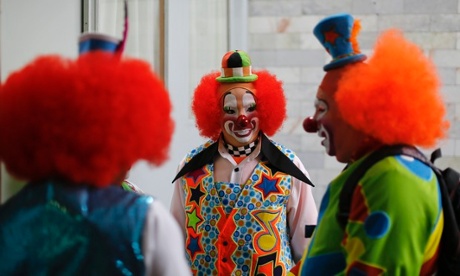So comedians are prone to psychosis? Comedy is more complex than that
Research published on Friday suggests that many comedians display signs of psychosis. This may well be a generalisation of what is a complex, diverse and little understood field – and by that, I mean comedy

I first did stand-up comedy in 2004. I’d always enjoyed making people laugh, which led me to take part in numerous comedy plays and the like in school and university. I never had the nerve to try stand-up though, I simply wasn’t brave enough.
Then I spent 18 months embalming dead people for a medical school, which really does tend to alter your standards when it comes to things you’re able/willing to tolerate, so I opted to give stand-up a go. What was the worst that could happen: I’d end up in a room full of people not laughing at me? I spend every day in a room full of people not laughing at me, at least these ones will still be breathing and have all their organs on the inside.
I signed up to do a brief five-minute set at a local open-mic night in Cardiff. The gig itself was a fun regular night but based in a pub in the rougher side of town with a regular clientele who would probably be given their own definitely-not-exploitative Channel 4 show if a producer had wandered in. I was meant to be the newbie in the middle, but on the night all the other acts cancelled so I was promoted to headliner, which was nice. It went surprisingly well, all things considered. Afterwards, when telling friends and family what I’d done, the most common response was “you must be mad”.
According to research published today, this is true. A study revealed that, when asked to fill in a questionnaire that looks into psychotic characteristics in “healthy” people, comedians scored “significantly higher on all four types of psychotic personality traits” when compared with the scores of actors and “non-creative” occupations. This obviously results in a number of speculations as to how elements of psychosis are useful for the creative process, how elements of madness make it easier to entertain a crowd etc.
It would be easy to critique the report(s) by emphasising how science and psychology are more complicated than that, as is my usual response, but ignoring the potential problems with self-assessment, the fact that psychotic traits can be normally distributed in the population and other issues, I thought it might be useful to critique science’s understanding of comedy for a change. As that rare thing, a neuroscientist/psychiatry lecturer with a decade of stand-up experience, I'm probably well placed to comment.
Most scientific studies into comedy/humour suffer from the fact that the researchers have their own definition of what comedy is, and many would disagree with this definition. Many comedians (myself included) have grumbled about the lumping together of all who do funny things for an audience as “comedians”; it’s an incredibly diverse and varied art form where everyone has their own techniques and style (apart from the gag thieves) and assuming all who do it are the same and therefore comparable does nobody any favours. If a known fan of classical jazz went to a punk concert and complained that the music was crap, their motives and self-awareness would be questioned. But comedians regularly get criticised by people based on nothing more than their own preferences, as if they’re somehow responsible for this. So lumping together 523 comedians together in the study may not be as useful as is implied.
Comedians are also compared to actors, presumably on the grounds that both perform for audiences. But acting and comedy are very different crafts; actors typically have to learn other people’s work, perform very precise actions, and rarely acknowledge the audience. Comedians typically have to write their own material and very much respond to the audience, which requires a different skill set entirely. So it may not be a logical comparison after all, but then no more than the blanket label of “comedian”.
The one individual cited in the report is Spike Milligan, comedy hero andmanic-depressive. But Milligan was a writer/actor/performer, not so much a stand-up, which is what many people think of when you say “comedian”. And as anyone who has read his war diaries could tell you, it’s implied that his depression and mental issues stem from his wounding in WWII, whereas he seems to have been a popular comedic personality before this point.
This also links to questions of cause and effect. The study cites “successful” comedians, presumably focussing on those who at least make a living from performing comedy, so they must be very experienced at it. But as has been pointed out often, doing anything often enough will result in your brain altering as it gets better at this task. Regularly writing jokes and amusing anecdotes that nobody has yet come up with in an increasingly crowded comedy marketplace will probably give rise to a tendency for divergent thinking, something also seen in psychosis. Could it be comedy that gives rise to signs of psychosis, rather than the other way around?
http://www.theguardian.com/science/brain-flapping/2014/jan/16/comedians-psychosis-comedy
No comments:
Post a Comment